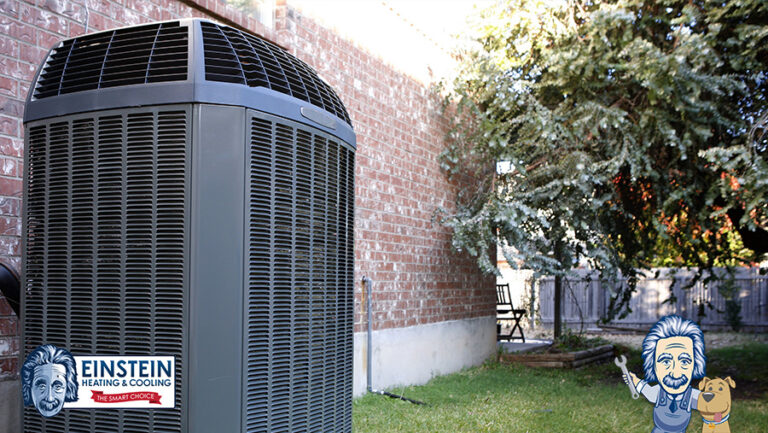
For professional HVAC system installation, turn to Einstein Heating and Cooling. Our experienced technicians specialize in providing reliable and efficient installation services for heating, ventilation, and air conditioning systems. We understand the importance of a properly installed HVAC system for your comfort and energy efficiency. Whether you need a new installation for a residential or commercial property, we have the expertise to handle projects of all sizes. Trust Einstein Heating and Cooling for quality workmanship, exceptional service, and a comfortable indoor environment. Contact us today to schedule your HVAC system installation.
Professional installation of heating, ventilation, and air conditioning (HVAC) systems is a crucial aspect of ensuring that residential and commercial properties are comfortable and safe. HVAC systems are responsible for regulating the temperature, humidity, and air quality of a building. A properly installed HVAC system can improve indoor air quality, reduce energy costs, and increase the overall comfort of a property. In this article, we will explore the importance of professional installation of HVAC systems and how it can benefit residential and commercial properties.
HVAC systems are complex and require specialized knowledge and skills to install. Proper installation ensures that the system functions correctly, efficiently, and safely. A poorly installed HVAC system can result in poor performance, increased energy consumption, and safety hazards such as carbon monoxide leaks. Professional installation by qualified HVAC contractors ensures that the system is installed correctly and meets all safety standards and regulations.
Professional HVAC contractors have the necessary training, tools, and experience to install HVAC systems efficiently and effectively. They are familiar with local codes and regulations and can ensure that the system is installed correctly and meets all safety standards. They can also recommend the best HVAC system for a property based on factors such as size, layout, and usage patterns.
Professional installation of HVAC systems can significantly improve indoor air quality. HVAC systems are responsible for filtering and purifying the air inside a building. A properly installed system can remove pollutants, allergens, and other harmful particles from the air, making it cleaner and healthier to breathe.
HVAC systems can account for a significant portion of a property’s energy costs. A poorly installed system can waste energy and result in higher utility bills. Professional installation ensures that the system is installed correctly and operates efficiently. This can result in lower energy consumption and reduced utility bills.
A properly installed HVAC system can improve the overall comfort of a property. It can regulate the temperature, humidity, and air quality, creating a comfortable and healthy indoor environment. This can result in increased productivity, better sleep, and improved overall well-being.
Professional installation can also increase the lifespan of the HVAC system. A properly installed system operates efficiently, reducing wear and tear on the components. This can extend the lifespan of the system and reduce the need for costly repairs or replacements.
Residential HVAC installation involves the installation of heating and cooling systems in homes and apartments. The installation process typically involves the following steps:
Assessment:
The first step in the residential HVAC installation process is to assess the property to determine the best HVAC system for the home or apartment. This involves considering factors such as the size of the property, the number of rooms, and the local climate. The HVAC contractor will also discuss the needs and preferences of the homeowner and any specific concerns or requirements they may have.
Design:
Once the assessment is complete, the HVAC contractor will design the HVAC system based on the homeowner’s needs and the specific requirements of the property. This involves selecting the appropriate components, such as the furnace or air conditioner, and determining the best layout for the system. The contractor will also take into account any existing ductwork or ventilation systems in the property.
Installation:
The next step is to install the HVAC system. This involves installing the furnace or air conditioner, ductwork, and ventilation system. The HVAC contractor will ensure that all components are installed correctly and meet all safety standards and regulations. They may also make any necessary modifications to the property, such as installing new ductwork or vents.
Testing:
Once the installation is complete, the HVAC contractor will test the system to ensure that it is functioning correctly and efficiently. This involves checking the airflow, temperature, and humidity levels to ensure that they are within the desired range. The contractor may also perform a system check to ensure that all components are working together correctly.
Maintenance:
Finally, the HVAC contractor will provide ongoing maintenance to ensure that the HVAC system continues to operate efficiently and effectively. This includes regular inspections, cleaning, and repairs. The contractor may also provide the homeowner with tips on how to maintain the system between maintenance visits.
Increased Energy Efficiency: A properly installed HVAC system can help reduce energy consumption and lower utility bills. Professional installation ensures that the system is installed correctly and operates efficiently, reducing waste and optimizing performance.
Commercial HVAC installation involves the installation of heating and cooling systems in commercial properties such as offices, retail spaces, and warehouses. The installation process for commercial HVAC systems is similar to residential systems but may involve additional considerations and requirements.
Assessment:
The first step in the commercial HVAC installation process is to assess the property and determine the best HVAC system for the commercial space. This involves considering factors such as the size of the property, the number of occupants, and the specific heating and cooling needs of the commercial space.
Design:
Once the assessment is complete, the HVAC contractor will design the HVAC system based on the specific requirements of the property. This may involve selecting specialized components, such as commercial-grade air conditioners or boilers, and designing complex ductwork systems.
Installation:
The next step is to install the HVAC system. This involves installing the furnace or air conditioner, ductwork, and ventilation system. The HVAC contractor will ensure that all components are installed correctly and meet all safety standards and regulations.
Testing:
Once the installation is complete, the HVAC contractor will test the system to ensure that it is functioning correctly and efficiently. This involves checking the airflow, temperature, and humidity levels to ensure that they are within the desired range. The contractor may also perform a system check to ensure that all components are working together correctly.
Maintenance:
Finally, the HVAC contractor will provide ongoing maintenance to ensure that the HVAC system continues to operate efficiently and effectively. This includes regular inspections, cleaning, and repairs. The contractor may also provide the commercial property owner or manager with tips on how to maintain the system between maintenance visits.
Increased Energy Efficiency: Professional installation of commercial HVAC systems can help reduce energy consumption and lower utility bills. The system is designed to meet the specific needs of the commercial space, ensuring that it operates efficiently and effectively, reducing waste and optimizing performance.
Improved Indoor Air Quality: Commercial HVAC systems can significantly improve indoor air quality. The system can filter and purify the air inside the building, removing pollutants, allergens, and other harmful particles. This can create a healthier indoor environment for employees, customers, and visitors.
Enhanced Comfort: A properly installed commercial HVAC system can improve the overall comfort of the commercial space. It can regulate the temperature, humidity, and air quality, creating a comfortable and healthy indoor environment. This can result in increased productivity, better employee satisfaction, and improved overall well-being.
Compliance with Regulations: Professional installation of commercial HVAC systems ensures compliance with safety regulations and standards. This includes proper installation, maintenance, and repairs, as well as the use of appropriate components and materials. Compliance with regulations can help avoid fines and legal issues.
Long-Term Cost Savings: Professional installation of commercial HVAC systems can lead to long-term cost savings. A properly installed system operates efficiently, reducing energy consumption and the need for costly repairs or replacements. This can result in significant cost savings over the lifespan of the system.
Choosing the right HVAC contractor is crucial to ensuring a successful installation of heating, ventilation, and air conditioning systems in residential and commercial properties. Here are some factors to consider when choosing an HVAC contractor:
Experience and Expertise: Look for an HVAC contractor with a proven track record of experience and expertise in the installation of heating, ventilation, and air conditioning systems. Check their credentials, certifications, and licenses to ensure they meet industry standards.
Reputation: Look for an HVAC contractor with a good reputation in the industry. Check online reviews and testimonials from previous clients to gauge their satisfaction with the contractor’s services.
Customer Service: Look for an HVAC contractor who provides excellent customer service. They should be responsive, transparent, and professional in all their dealings with clients.
Cost: Look for an HVAC contractor who offers competitive pricing without compromising on quality. Ask for a detailed quote and compare it with other contractors to ensure you are getting a fair price.
Warranty: Look for an HVAC contractor who offers a warranty on their services and products. A warranty can provide peace of mind and protection against unexpected issues or defects.
Professional installation of heating, ventilation, and air conditioning systems in residential and commercial properties can provide numerous benefits, including increased energy efficiency, improved indoor air quality, enhanced comfort, compliance with regulations, and long-term cost savings. Choosing the right HVAC contractor is crucial to ensuring a successful installation and long-term operation of the system. Consider the contractor’s experience, reputation, customer service, cost, and warranty when choosing the right HVAC contractor for your needs.
Are you ready to transform your entrepreneurial aspirations into a tangible venture and embrace the exciting realm of franchise ownership? With a few decisive moves, you could be on the fast track to extraordinary success. Don’t hesitate any longer; embark on your path to becoming the proud boss of your very own business today!
